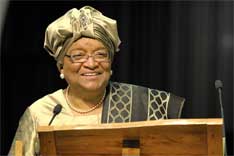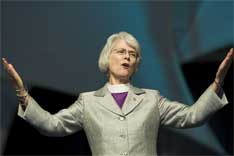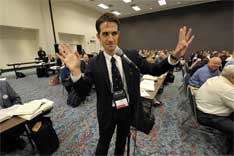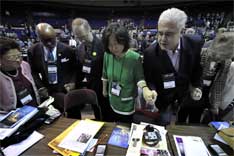The 2008 United Methodist General Conference opened its legislative session on April 23 with a Communion service celebrated at a wooden table fashioned from trees destroyed by Hurricane Katrina.
For the next 10 days, delegates heard stirring speeches and sermons offered from a pulpit made of the same hurricane-damaged trees-taken from the historic Gulfside Assembly retreat center in Waveland, Miss. Both the pulpit and the Communion table served as reminders of physical and spiritual storms and the common faith that links members of the 11.5 million-member church.

Delegates raise their hands in praise during opening worship on April 22. A UMNS photo by John C. Goodwin.
Under the theme "A Future with Hope-Making Disciples for Jesus Christ for the Transformation of the World," the conference began on the 40th anniversary to the day when the Evangelical United Brethren Church united with the Methodist Church to form The United Methodist Church.
The 2008 meeting ended on May 2 with a worship service led by Bishop Gregory Palmer, the new president of the church's Council of Bishops, declaring hope for the church through the power of the Holy Spirit.
In between, the assembly approved a $642 million denominational budget for the next four years and created a hymnal revision committee. It generally retained the church's stances on homosexuality, including the declaration in the church's Social Principles that homosexual practice is "incompatible with Christian teaching." Delegates opened the door to significant structural changes as the church works to address its increasingly global nature. And it tweaked the denomination's mission statement to read: "The mission of the church is to make disciples of Jesus Christ for the transformation of the world."
The worldwide church
The assembly reflected changing demographics, as membership has shrunk in the United States while growing in Africa and the Philippines and parts of Europe.
This gathering was less centered on issues confined to the United States than at previous assemblies. That was partially because 278 of the 992 delegates came from outside of the United States100 more than attended the 2004 session. It also was the result of proposals from a task force studying the global nature of the church.

The Hope for Africa Children's Choir of Uganda shares song and dance. A UMNS photo by Paul Jeffrey.
Delegates approved 23 constitutional amendments that would make it possible to change the church's U.S.-centric structure to a more uniform global structure. The amendments must be ratified by a two-thirds vote of the aggregate total of annual conferences. A 20-member committee will bring recommendations to the 2012 assembly.
In separate action, The United Methodist Church in Côte d'Ivoire, the largest regional conference of the worldwide denomination with almost 700,000 members, received its full rights and responsibilities. As a result, United Methodists in the West African country, which has only two delegates at this General Conference, will receive significantly greater representation at future assemblies.
Delegates approved $20 million for Africa University in Zimbabwe; $10 million was already budgeted in apportioned funds, and $10 million will be raised through World Service Special Gifts.
Delegates also approved $2 million to help United Methodist theological schools in Africa train additional pastors.
Budget
The delegates approved a $642 million denominational spending plan for the next four years built around four areas of focus for the immediate future:
- Developing principled Christian leaders.
- Creating new places for new people by starting new congregations and renewing existing ones.
- Engaging in ministries with the poor.
- Improving global health, especially attacking the killer diseases of poverty.
It was the first time the church has developed a budget on an outcome-based model, and church leaders celebrated the collaborative process used to reach a consensus among general agencies and other interests.
The budget is 4.8 percent higher than the spending plan for the 2005-2008 period.
Presentations

Liberian President Ellen Johnson Sirleaf, aUnited Methodist,speaks to the assembly. A UMNS photo by Paul Jeffrey
U.S. President George W. Bush, a United Methodist, declined an invitation to speak, though he and first lady Laura Bush sent greetings.
Instead, another United Methodist head of stateLiberian President Ellen Johnson Sirleafdelivered an address that was an assembly highlight.
"This is a special honor for me," she said. "I am the first African leader and the first female president to address the General Conference of The United Methodist Church." Her message included that "Liberia is on the way back" after years of civil war.
William H. Gates Sr., co-chair of the Bill & Melinda Gates Foundation, thanked the denomination for being a partner in the Nothing But Nets campaign to eliminate malaria in Africa. More than $20 million has been raised since the campaign began in 2006. The church recently learned it will receive a $5 million grant from the United Nations Foundation with help from the Gates Foundation on other health initiatives.
General Conference dedicated most of its second day of business to a series of addresses designed to provide vision for the future of The United Methodist Church.

Bishop Sharon Brown Christopher delivers the Episcopal Address. A UMNS photo by Mike DuBose.
Bishop Sharon Brown Christopher used an innovative format to deliver the Episcopal Address on behalf of the Council of Bishops. The message was filled with songs, multimedia and multisensory images about how people receive and give hope, and are transformed by encounters with Christ. She attributed some of the U.S. membership decline to "ruptures in our United Methodist relationships. Left or right, conservative or liberal, we treat our baptized brothers and sisters as if they are our enemies" and seek to destroy those who have a different viewpoint or perspective, she said.
The first-ever Young People's Address was delivered by six young people of different ages and backgrounds. The presentation included videos, photos, drumming and singing. "We have shared stories of persecution, homelessness, and what it means to be a young person in a world desperately in need of Jesus," said Matt Lockett of Seattle, one of the presenters. "What you do with what you have heard is really up to you."
Lyn Powell, lay leader of the North Georgia Conference, delivered the Laity Address. She challenged lay members to assume responsibility for reaching the unchurched and said it is unreasonable for clergy, with their myriad responsibilities, to spend large quantities of time engaging the unchurched.
Choirs from all over the world performed during the assembly. Presentations by the 23-member Hope for Africa Children's Choir, including many Ugandan children from displaced persons' camps, were among the musical highlights.
Homosexuality
General Conference essentially upheld the status quo on sexuality issues.
In retaining its stance declaring homosexual practice "incompatible with Christian teaching," the assembly rejected a majority report from a legislative committee that recommended new language that faithful people disagree on the topic but that "all seek a faithful witness." A 516-416 vote replaced the majority report with a minority report calling for retention of the incompatibility clause. A subsequent final vote of 501-417 made it official.

Some delegates stand to protest the church's position on homosexuality. A UMNS photo by Paul Jeffrey.
The assembly affirmed that all people are "individuals of sacred worth created in the image of God." Delegates also retained statements asking "families and churches not to reject or condemn lesbian and gay members and friends."
On the day after emotional debate and votes on many of the issues,approximately 250 advocates for full inclusion were allowed to walk silently through the aisles of the legislative gathering as an act of protest. Participants covered the Communion table with a black shroud to mourn the church's position in its Social Principles and the conference's actions that deny gays and lesbians the right to serve as clergy.
Palmer expressed a "deep sense of gratitude" for both how the demonstration was handled and how delegates and bishops responded.
In other actions related to sexuality, the conference:
- Asked the United Methodist Board of Church and Society to develop educational resources and materials on the effects of homophobia and heterosexism, the discrimination or prejudice against lesbians or gay men by heterosexual people.
- Continued the policy of not funding groups that promote the acceptance of homosexuality, but noted that funds also should not go to groups that violate church principles against rejecting or condemning lesbians, gays and friends.
- Retained language defining marriage as a relationship between one man and one woman.
- Let stand language in the Book of Discipline regarding pastoral authority over church membership.
The church did not take action to remove transgender pastors from ministry, leaving the Rev. Drew Phoenix to lead his Baltimore congregation. Phoenix transitioned from female to male about two years ago.
Legislative process
The assembly received 1,564 proposals, 540 fewer than the number processed by the 2004 session, but the body had one less day to work. Former General Conference sessions lasted 12 days but took a day of rest at the midpoint on Sunday. This year, as a cost-saving measure, the assembly met 10 days, including Sunday as a work day.
The loss of the day of rest took its toll on the conference, however, and delegates voted to reinstate that day for the next assembly in 2012.
Delegates created a 24-member standing committee on faith and order to help bishops and the church reflect on matters of faith, doctrinal teaching, order and discipline. The group also will provide study materials upon the request of the bishops, the Connectional Table or General Conference.

Will Green of the New England conference speaks to a legislative subcommittee. A UMNS photo by Paul Jeffrey.
The conference called for a continuation of a study authorized by the 2004 assembly on the church's ordering of ministry. The 28-member study group is to address the ordering of ministry, the separation of ordination and conference membership, and the streamlining of the ordained ministry candidacy process.
Delegates approved the creation of a hymnal revision committee and authorized it to bring a proposed hymnal to the 2012 General Conference. An additional group will investigate the possibility of an Africana hymnal that incorporates music and liturgy from Africaas well as Caribbean, African-American and other traditions with African roots.
Constitutional amendments
General Conference passed a number of amendments to the church's constitution, which now await action from annual (regional) conferences. All constitutional amendments approved by a two-thirds vote of General Conference must be ratified by a two-thirds affirmative vote of the aggregate number of voting annual members.
Delegates passed a constitutional amendment that reduces from two to one the number of years a person must be a professing member of a local church before he or she can be a member of an annual conference.
Annual conferences also will vote on proposals that provide for newly created conferences to be represented at general, jurisdictional or regional conferences on a non-proportional basis. The issue arose after the Côte d'Ivoire Conference was assigned two delegates for the 2008 General Conference.
One amendment would enable local pastors, associate members and provisional members to join ordained ministerial members in full connection in voting for delegates to General and jurisdictional conferences. To vote, local pastors must have completed the Course of Study or master of divinity degree and have served under appointment for two consecutive years immediately preceding an election. Only ordained members in full connection with an annual conference may be delegates.
If annual conferences ratify another amendment, then local churches, jurisdictional and General Conference, "organizations, groups, committees, councils, boards and agencies" will have to adopt ethics and conflict-of-interest policies. These policies will apply to both members and employees to help them "embody and live out our Christian values."
Another constitutional amendment would make it clear all persons shall be eligible to attend worship services and, upon taking vows, become church members.
Judicial Council

The Judicial Council includes five new members. A UMNS photo by Neill Caldwell.
The Rev. Susan Henry-Crowe is the new president of the Judicial Council, becoming the first woman to lead the denomination's nine-member "supreme court." The other new leaders are Jon R. Gray, vice president, and the Rev. Belton Joyner, secretary.
Henry-Crowe is dean of Cannon Chapel and religious life at Emory University. Gray returned to private law practice in Kansas City, Mo., last fall after 20 years as a family court judge. Joyner, a retired member of the North Carolina Conference, is serving as an interim district superintendent.
Angela Brown of California-Nevada, Ruben Reyes of the Philippines, the Rev. Kathi Austin-Mahle of Minnesota and the Rev. Bill Lawrence of North Texas also were elected as new members. Beth Capen, New York Conference, and the Rev. Dennis Blackwell, Greater New Jersey, will complete their eight-year terms in 2012.
Social action
Delegates urged U.S. lawmakers to ensure that immigration laws don't tear families apart, and they advocated for "full protection of all workers."
General Conference voted 416-384 for the United Methodist Board of Church and Society and the Women's Division of the Board of Global Ministries to continue as members in the Religious Coalition for Reproductive Choice.
The assembly added a statement on abortion to the Social Principles offering "ministries to reduce unintended pregnancies" and to assist the ministry of crisis pregnancy and support centers that help women "find feasible alternatives to abortion."
Stating that Israel continues to violate international law by building a wall on Palestinian land, the conference called upon Israelis and Palestinians to uphold U.N. resolutions and International Court of Justice rulings.
Delegates called on United Methodists to divest funds from companies that support the government of Sudan in order to end the genocide in that area.

Laurie Hays Coffman examines boots and shoes that symbolize people killed in the U.S. invasion and occupation of Iraq. A UMNS photo by Paul Jeffrey.
The conference asked the Board of Church and Society to identify and publish on its Web site educational resources on stem-cell research. The resolution encourages pastors to use the resources to become informed about the use of embryonic stem cells for medical research and to offer these resources for study in local churches.
Noting that more than 400 people have been put to death in Texas since 1982, the assembly asked the Texas legislature to end executions.
The body encouraged the implementation of the universal school lunch program and also called for equal rights of men with regard to parental leave and child custody.
On the 100th anniversary of the Social Creed, delegates decided that a proposed new creed would serve the church better as a "companion litany." It has been set to music.
Other items
General Conference approved a full communion agreement with the Evangelical Lutheran Church in America, in which each church recognizes the other's ministry and mission, the authenticity of the other's baptism and Eucharist, and the interchangeability of ordained ministers. The ELCA's assembly will act on the agreement in 2009.
Delegates learned that church members raised $3 million to restore churches damaged by Hurricane Katrina. More than $60 million was given through the United Methodist Committee on Relief for humanitarian aid in the Gulf Coast.
The 40th anniversary of the founding of the denomination also marked the 40th anniversary of the dissolution of the Central Jurisdiction, a racially based structure, and the formation of the Commission on Religion and Race. The assembly also celebrated the 60th anniversary of the Advance and the 100th anniversary of ministry to Methodist men, the Social Creed and the Board of Pension and Health Benefits.

Delegates from the New York Annual (regional) Conference pray together. A UMNS photo by Paul Jeffrey.
Several health and wellness petitions sponsored by the pension board were adopted.
The assembly increased the retirement age of bishops from 66 to 68 and the retirement age of other ordained clergy from 70 to 72.
Concerned about finances, delegates approved a plan that will result in one less bishop in four of the five U.S. jurisdictions, beginning in 2012. The savings will be used to fund new episcopal areas elsewhere. The action will not affect the Southeastern Jurisdiction, which already elects one less bishop than the present formula allows.
Pastors or district superintendents may now ask the bishop to give sacramental authority to a deacon if an elder is not present. That right is confined to the location of a deacon's primary appointment. In areas where it would take a great deal of time to deliver the sacraments to people, a layperson is given the right to deliver the Communion elements.
People who join United Methodist churches henceforth will promise to be faithful in "their witness" as well as in their "prayers, their presence, their gifts and their service."
Final session
The final gavel came down May 2 at 11:15 p.m., followed by worship, which ended shortly before midnight.
The next General Conference will be in 2012 in Tampa, Fla.
*Peck, a four-time editor of the Daily Christian Advocate, served as an editor for United Methodist News Service during the 2008 General Conference-his 11th assembly.
News media contact: Tim Tanton, Nashville, Tenn., (615) 742-5470 or newsdesk@umcom.org.
Related Articles
Resource
Like what you're reading? Support the ministry of UM News! Your support ensures the latest denominational news, dynamic stories and informative articles will continue to connect our global community. Make a tax-deductible donation at ResourceUMC.org/GiveUMCom.



